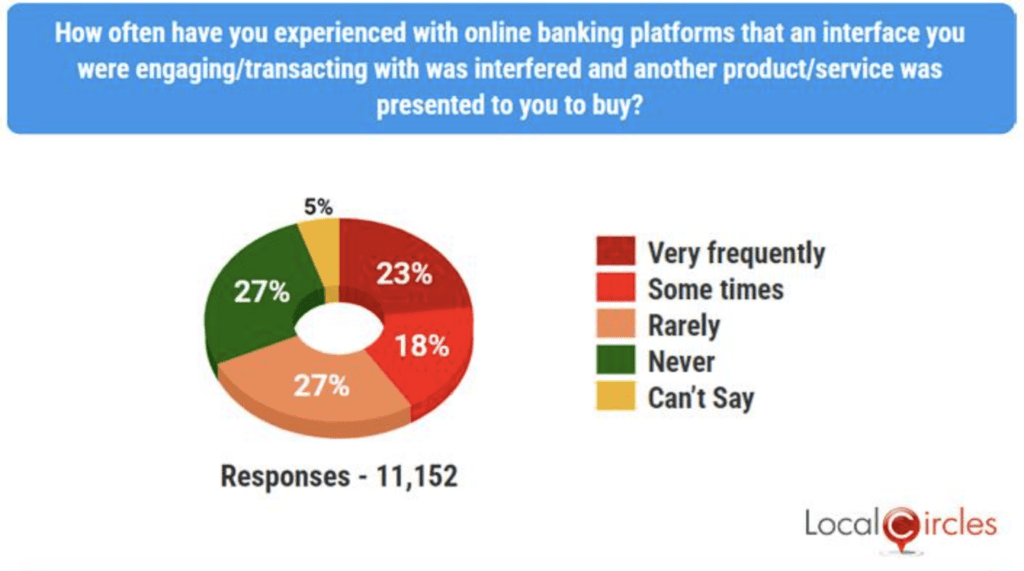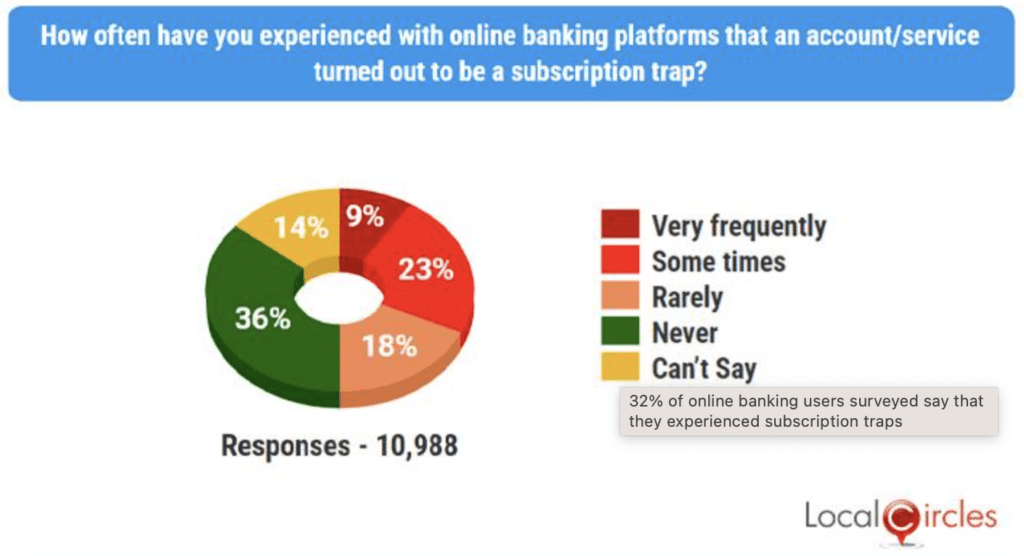In today’s digital age, convenience often masks a darker reality. A recent survey conducted by LocalCircles has shed light on the prevalence of deceptive practices, or “dark patterns,” within India’s online banking sector. An alarming 63% of respondents disclosed instances where online banking platforms had deducted fees from their accounts without prior disclosure.
The deceptive practice of “hidden banking charges” often arises when users are led to believe they’ve been approved for a premium credit card, only to discover hefty fees (other than taxes) on their first monthly bill, which were never disclosed upfront. Such hidden charges, whether for annual credit card fees, money transfers, or transactional SMS services, have become a contentious issue among consumers.
The LocalCircles survey garnered an impressive 44,000 responses from users of online banking across 363 districts in India.
Unveiling Dark Patterns: Interface Interference
Another form of the dark pattern observed in online banking involves customers inadvertently acquiring products or services they hadn’t intended to pursue. This occurs through the implementation of interface interference tactics where online banking platforms disrupt the seamless flow of online transactions. As a result, users are driven into unintended purchases or subscriptions of products/services. Whether through intrusive pop-ups, misleading prompts, or subtle nudges, these tactics manipulate user behaviour and erode consumer autonomy.
Out of the 11,152 responses received, a significant 41% of online banking users indicated experiencing interface interference either very frequently or sometimes. On the other hand, a notable 27% reported experiencing interface interference rarely or never.

Subscription Traps
The third type of dark pattern observed in online banking is subscription traps. In these scenarios, consumers can easily sign up for a new product or service online, only to find themselves locked into recurring charges without straightforward options for unsubscribing. Instead of offering online cancellation, users are often required to visit a bank branch and navigate through paperwork and hassles to terminate the service.
Out of 10,988 responses, only 9% of online banking users reported encountering a subscription trap “very frequently,” while a notable 23% stated experiencing it “sometimes,” and 18% indicated it happened “rarely.”
Overall, 32% of surveyed users confirmed experiencing subscription traps where they were forced to visit bank branches or offices or contact the bank via phone to unsubscribe, as online cancellation options were unavailable.

Bait and Switch: False Promises and Misleading Offers
Another concerning revelation from the survey is the prevalence of bait-and-switch tactics used by online banking platforms in India. These tactics are similar to deceptive practices seen in e-commerce.
A significant 39% of respondents reported being promised one product or service but receiving something else.
In a Nutshell
The LocalCircles survey highlights numerous dark patterns in online banking in India, necessitating action from both consumers and banking regulators. These deceptive practices not only undermine consumer trust in online banking but also contradict the Government’s Digital India mission.
Last year, M. Rajeshwar Rao, the Deputy Governor of the Reserve Bank of India (RBI), warned about the prevalence of dark patterns in the misselling of digital loans. He emphasized the deceptive nature of these practices, which trick users into availing of high-cost loans disguised as instant loans. It is imperative for both consumers and regulators to take proactive measures to combat these dark patterns and ensure transparency and fairness in online banking practices.

